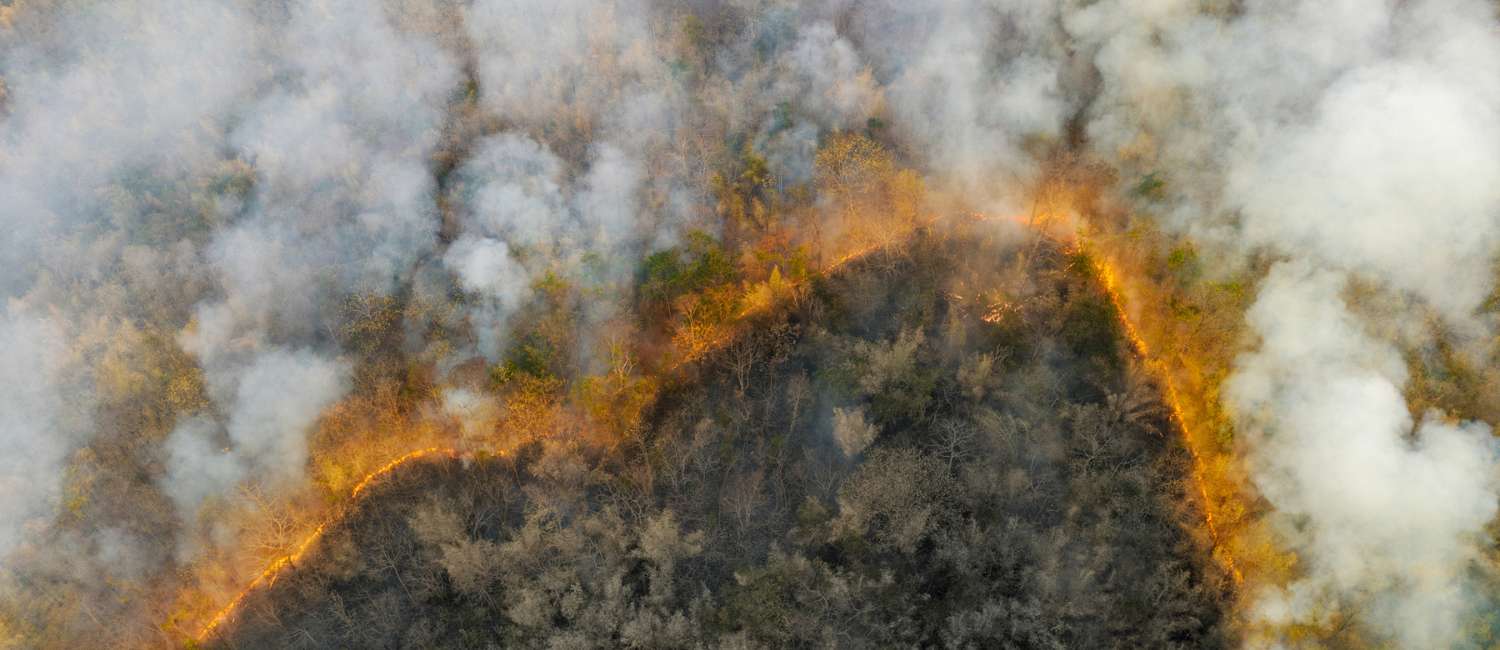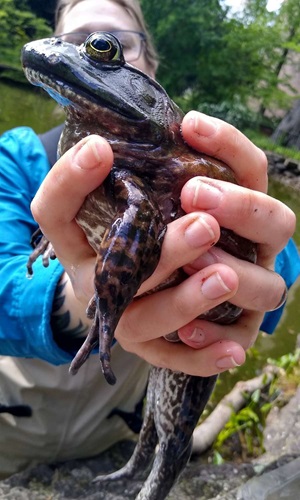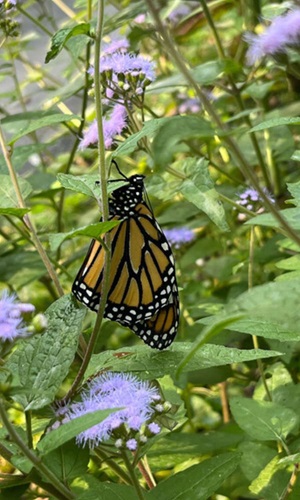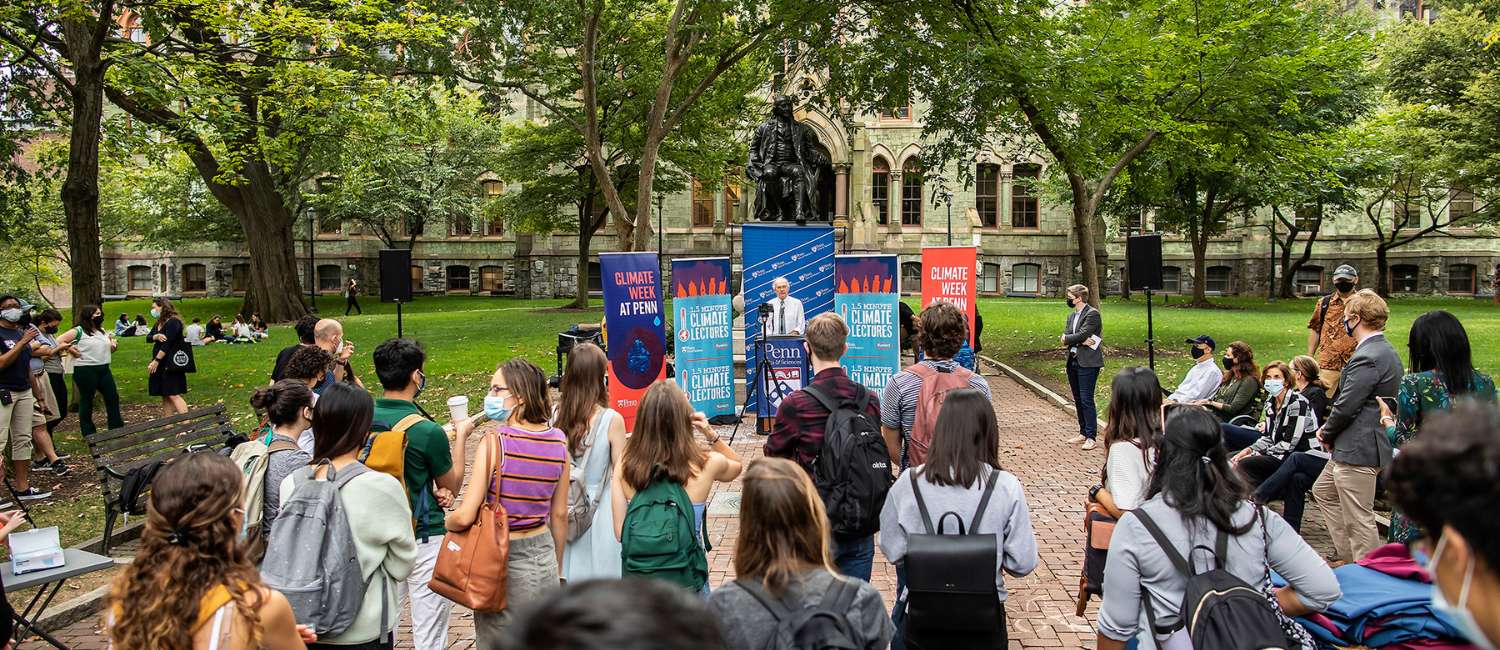 Wildfires are becoming increasingly common as a result of the climate crisis, endangering biodiversity and humans. (Image: iStock/Toa55)
Wildfires are becoming increasingly common as a result of the climate crisis, endangering biodiversity and humans. (Image: iStock/Toa55)
Climate Week returns to campus for the fourth time from Sept. 18-22. The theme for this year’s event is biodiversity and the human connection with nature, but events will also address topics including the connections between climate and health, climate and democracy, sustainable architecture, and the role of AI in tackling climate change.
There’s a diverse suite of activities and events to choose from, and various ways to get engaged—from lectures and panel discussions to hands-on data collection, birding, and treetop yoga.
“No matter what your career, your discipline, your major, what you’ve decided to study, where you come from or where you live, the climate crisis impacts you, and knowing about it is much, much better than not knowing about it,” says Simon Richter, the Class of 1942 Endowed Term Professor of German in the School of Arts & Sciences, who has helped organize each Climate Week.
A campus-wide effort, Climate Week is supported by many schools and offices and overseen by a core organizing committee with faculty, staff, and student membership, Richter included. The Environmental Innovations Initiative, part of the Office of the Provost, serves as administrative lead of the decentralized effort, which this year entails 30-some events offering varied opportunities for cross-campus collaboration and climate discussions.
“Penn has a lot of different organizations involved with climate, and Climate Week provides a platform for all of the people on campus to discuss climate in one place and to build connections between the energy side, the climate side, and the water side,” says Chunran Yang, a second-year student from Beijing in the Master of Environmental Studies program, and a member of the Climate Week core organizing committee.
Climate and biodiversity
Experts warn that climate warming is likely to be devastating for global biodiversity. In recognition of this, several Climate Week events provide opportunities for the community to learn about the links between the climate and biodiversity crises, as well as opportunities to reconnect with nature and celebrate the importance of biodiversity.
On Monday from 11:30am-1:30pm, the Penn Sustainability Office is hosting a Biodiversity Fair on College Green. The tabling event will feature interactive activities, insect demonstrations, giveaways, and information about volunteer opportunities.
On Tuesday, Sept. 19, at 4 p.m , a panel will discuss the crisis of climate-driven extinction. The discussion, which features School of Arts & Sciences (SAS) faculty Michael Mann and Erol Akçay, and visiting fellow Zinta Zommers, is hosted by Perry World House in collaboration with the Penn Center for Science, Sustainability and the Media, and the Department of Biology.
Documenting the wildlife that share Penn’s campus
 Tanya Dapkey from the Academy of Natural Sciences holds a bullfrog during the fall 2022 Bioblitz at the BioPond. Dapkey will be attending and helping with the event again this year. (Image: Peter Javian)
Tanya Dapkey from the Academy of Natural Sciences holds a bullfrog during the fall 2022 Bioblitz at the BioPond. Dapkey will be attending and helping with the event again this year. (Image: Peter Javian)
On Thursday between 4 and 6 p.m., the Department of Biology in SAS and the School of Veterinary Medicine’s Wildlife Futures Program will host a Bioblitz at James Kaskey Memorial Park, widely known as the BioPond. During this hands-on event, volunteers will help document the diversity of animals that reside on campus. This is the second time Climate Week has hosted a BioBlitz at the BioPond.
“It’s a good way to take a moment to pause and take in what’s really happening around us,” says organizer Karen Verderame of Penn Vet. “People can expect a nice afternoon outside, and an opportunity to engage with other stewards of the environment and discover more about what wildlife utilizes our campus, and how we can better share our campus with that wildlife.”
Pollinator power
On Monday, Sept. 18, the Penn community is invited to celebrate Pollinator Power in a two-part event. First, the Philadelphia-based Mexican folk-dance group Ñuuxakun will perform a dance dedicated to Monarch butterflies under the Climate Week Tent on College Green.
 An adult monarch butterfly resting on a flossflower plant. Monarch butterflies migrate from Mexico to the continental United States, stopping along the way for nectar and to lay eggs. (Image: Julie Ellis)
An adult monarch butterfly resting on a flossflower plant. Monarch butterflies migrate from Mexico to the continental United States, stopping along the way for nectar and to lay eggs. (Image: Julie Ellis)
“Our event aims to honor the profound cultural and folklore significance of monarch butterflies and other pollinator species,” says Karla Terroba, program coordinator at the Environmental Innovations Initiative and a member of the core organizing committee for Climate Week. “These magnificent yet threatened pollinators, revered across cultures, serve as poignant symbols of our interconnectedness with the natural world and the delicate balance of ecosystems. Through mesmerizing performances, we hope to celebrate and raise awareness of their vital role in sustaining life on our planet.”
After the performance, attendees will be invited to help plant a Monarch Waystation Garden in the Penn Student Garden behind Harrison College House and hear from Penn Vet experts about the critical role pollinators play in our ecosystems. The new garden, supported by Facilities & Real Estate Services, will be planted with milkweeds, the plants that Monarch caterpillars feed on, as well as nectar producing flowers to support adult butterflies.
The new monarch waystation will be certified by Monarch Watch, a nonprofit dedicated to the butterfly, and added to the Monarch Waystation Registry, an online listing of monarch waystations worldwide. Monarch butterflies migrate from the continental United States to Mexico every year, stopping along the way for nectar and to lay eggs. Though milkweeds and nectar plants can be found elsewhere on campus, this is Penn’s first official Monarch waystation.
“By planting a monarch habitat with native nectar plants and milkweeds, you’re also supporting a much larger pollinator community of butterflies, moths, and beetles,” says Julie Ellis, co-director of the Wildlife Futures Program and another member of the Climate Week organizing team, who will be speaking at the event. “Pollinator habitat is under threat in general, but there’s actually a lot you can do. A monarch waystation, for instance, only requires a minimum area of 10 feet by 10 feet, and if more and more people start creating that habitat in their yards or in their shared community gardens, it will make a difference.”
Several live monarchs—at various stages of development—will be present at the pollinator planting for participants to observe.
Climate and health
The climate emergency is a health emergency. On Tuesday, Sept. 18, from 12-1:30 p.m. at College Green, a deans’ roundtable discussion, “Collaborating on Climate and Health,” will highlight the ways in which the climate crisis is impacting health and health education, as well as ways in which health professions could improve their practices to reduce their environmental footprint.
“Issues of sustainability and global health affect all of us and future generations,” says Mark Wolff, the Morton Amsterdam Dean of the School of Dental Medicine. “Dental practice creates a significant waste stream and has a significant carbon footprint. We need to engage our profession and our students in changing that footprint.”
The roundtable will feature leaders from Penn's five health schools—the Perelman School of Medicine, the School of Veterinary Medicine, the School of Dental Medicine, the School of Nursing, and the School of Social Policy & Practice—and is open to the entire Penn community.
“The deans’ roundtable is a great opportunity to share interconnections across health sectors, including health impacts, health disparities, adaptation strategies, and opportunities to reduce the carbon footprint of our respective health sectors,” says Dean Andrew Hoffman of the School of Veterinary Medicine. “This is an important moment to develop curriculum across the health schools to empower the next generation, and this will be advanced more efficiently if the health centers work together given the commonality of the problems and solutions.”
1.5* Minute Climate Lectures—breaking down ‘our summer from hell’
On Wednesday, Sept. 20, at noon, seven faculty experts will give 1.5* Minute Faculty Climate Lectures. The lecture series is named after the global climate target to keep global average temperatures from rising more than 1.5°C above pre-industrial levels.
This year, the lectures will center around “our summer from hell,” says Richter, and each faculty member will share their perspective on an aspect of this summer’s extreme weather. “The summer that we experienced—not just in Philadelphia, but all over the world—was a 1.5° summer,” says Richter. “We got our first taste of what that means, and this is an occasion for us to really take notice of that, and also to hear from Penn experts about the impacts of all of the climate change-related weather events that took place over the summer and put them into a big picture.”
 Paul Sniegowski delivers closing remarks following the 1.5* Minute Climate Lectures at Climate Week 2021.
Paul Sniegowski delivers closing remarks following the 1.5* Minute Climate Lectures at Climate Week 2021.
The short faculty talks will be followed by a panel discussion and Q & A, moderated by Paul Sniegowski, professor of biology and Stephen A. Levin Family Dean of the College of Arts & Sciences.
“Our planet is now hotter than at any previous time in recorded human history,” says Sniegowski. “This is indeed a ‘fragile moment,’ in the words of SAS professor Mike Mann, yet we can still hold off the worst effects of our abuse of fossil fuels if we act together, starting now.”
On Friday, Sept. 22, at 1 p.m., a student panel will deliver their own 1.5* minute climate lecture series.
Find your place in the climate movement—something for everyone
Climate Week invites everyone—undergraduates, graduate students, faculty, staff, and the Penn and West Philadelphia community—to find their place in the climate movement.
Other events include:
- On Monday, Sept. 18, at noon, a panel discussion of the state of environmental journalism with guests from Inside Climate News. The panel will be hosted by the Penn Center for Science, Sustainability and the Media and the Annenberg Public Policy Center and moderated by Michael Mann.
- Birding at Morris Arboretum & Gardens on Wednesday, Sept. 20, at 9:30 a.m. and 5:30 p.m.
- On Thursday, Sept. 21, a film screening of “The Lake at the Bottom of the World” and a discussion with Kathy Kasic, the film’s director and an associate professor of film at California State University, moderated by Jane Dmochowski of the Department of Earth and Environmental Science in SAS. The film follows an international team of scientists as they explore a subglacial lake buried 3,600 feet beneath the Antarctic ice to reveal new information about Earth’s past climate.
- Climate Week closes on Friday, Sept. 22, with a Treetop Yoga evening event at Morris Arboretum & Gardens from 5-6 p.m. Participants will join yoga instructor Maura Manzo for a yoga series that combines the physical and mental benefits of yoga with the beauty and serenity of the natural world.
View the full week’s schedule on the Climate Week website.
 Water flowing in the BioPond in James Kaskey Memorial Park. The Department of Biology in SAS and the School of Veterinary Medicine’s Wildlife Futures Program will host a “Bioblitz” at the BioPond during Climate Week in the park to document the diversity of animals that use Penn’s campus.
Water flowing in the BioPond in James Kaskey Memorial Park. The Department of Biology in SAS and the School of Veterinary Medicine’s Wildlife Futures Program will host a “Bioblitz” at the BioPond during Climate Week in the park to document the diversity of animals that use Penn’s campus.